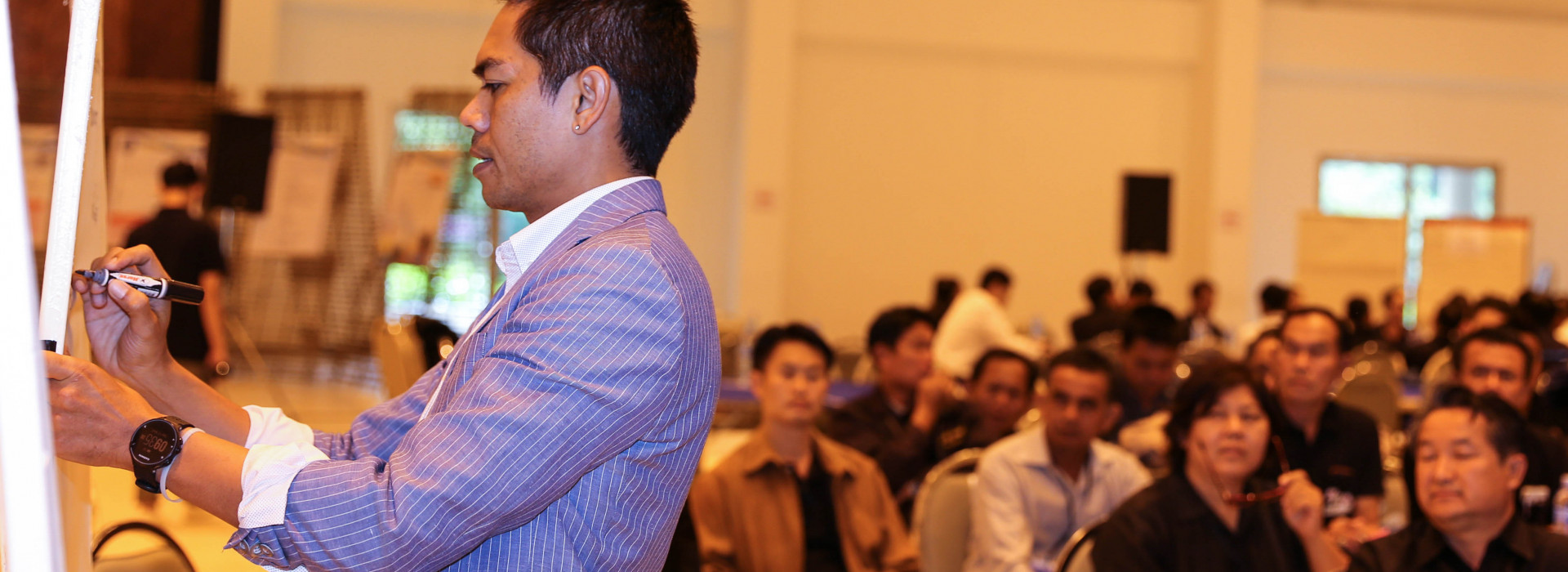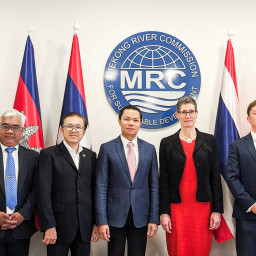Lessons from Bilateral Water Cooperation Shared with Stakeholders in Thailand
15 September 2017, Sakon Nakhon, Thailand – Frequent dialogue to understand each other, attention to different needs of the concerned countries, and strong commitment to joint actions are some of the main lessons learnt from bilateral projects of water cooperation among the four Mekong countries of Cambodia, Lao PDR, Thailand and Viet Nam, according to a public regional forum organised by the Thai National Mekong Committee.
Transboundary water resources management in the Mekong sub-basins along the borders have been experimented on a bilateral basis through the Mekong Integrated Water Resources Management (IWRM) Project of the Mekong River Commission (MRC) since late 2013. The four countries have launched five bilateral projects, each focusing on fisheries, delta, lake, river, or wetland resources management, to develop cross-border cooperation to address common resources management issues such as water quality degradation and insufficient data sharing for flood and drought control.
The regional forum “Lower Mekong Transboundary Cooperation: Joint Actions Joint Solutions” in Sakon Nakhon was held from 12 – 14 September to share achievements of the bilateral projects and explore lessons for future collaboration in the extended areas among the Mekong countries, in particular between Thailand and its neighbors. About 200 participants from community-based river basin networks, academic institutions, public agencies and international organisations based in Thailand attended the forum.
Among the five bilateral projects, Thailand has been paired with Cambodia over lake governance and with Lao PDR over wetland management. Cambodia and Viet Nam have worked on delta resources management and hydro-development issues, while Lao PDR collaborates with Cambodia for fisheries matters.
Sharing experiences of those bilateral projects, representatives of the four Mekong countries laid out a few key points that have made their projects successful.
“The most important thing is that the two countries are now aware of transboundary issues and committed to solving those issues together,” said Phai Sok Heng, Cambodian consultant to the Mekong Delta project. He continued that frequent meetings and discussions to understand each other was a key factor to find common issues and explore joint solutions through cooperation. “We’ve met so many times to discuss and work together for common goals, and finally started understanding our counterparts more. Without this understanding, it was impossible to explore effective collaboration.”
Project members of other countries also echoed a similar view and shared the challenges they encountered during the project execution. “It was difficult to communicate between the two countries when they had different interests,” said Vietnam’s Senior Programme Officer Tran Minh Khoi, recalling lengthy discussions held to agree on joint transboundary issues in the face of hydropower and irrigation development. “How to consolidate different needs of the two countries was the biggest challenge.”
Sakon Nakhon is a center of the Nam Kam river basin that has been matched up with Lao’s Xe Bang Hieng basin for mutual learning on the integrated planning and management of wetland resources. Lao consultant Daovinh Souphonphacdy said that even though the two countries are at a different economic development stage, they could still learn from each other on how to better manage wetlands. “In our case, similar culture and customs have helped us understand each other better,” she said.
During the forum, 200 participants had an opportunity to further discuss in a smaller group how to apply those lessons for basin management in other parts of the Mekong Basin, in particular in wetland management, fisheries, climate change adaptation, and flood and drought management.
Patcharee Saiboonyuan from the Nam Hueang river basin working group in Leoi, Thailand, was pleased to have that opportunity. "The information provided by the bilateral projects was very helpful for us because they could be applied to other working groups like us," she said after the forum, elaborating that her group is now looking into a possibility to collaborate with Lao counterparts to address forest fire issues along the river. “We’d like to work on forest fire prevention with Lao people. Collaboration between the government and the government might take some time to develop, but cooperation between people and people in the local area should be easier. The lessons shared by the bilateral projects are encouraging.”
The Mekong IWRM Project aims to facilitate transboundary dialogue at regional, national and sub-basin levels, and promotes IWRM principles of coordinated planning and management of water resources for sustainable development. Its bilateral projects are funded by the World Bank, and slated for completion in March 2018.
Please visit this link for a snapshot of opinion from the participants on the shared lessons.
Sharing Lessons from Bilateral Water Cooperation by The Mekong River Commission on Exposure





